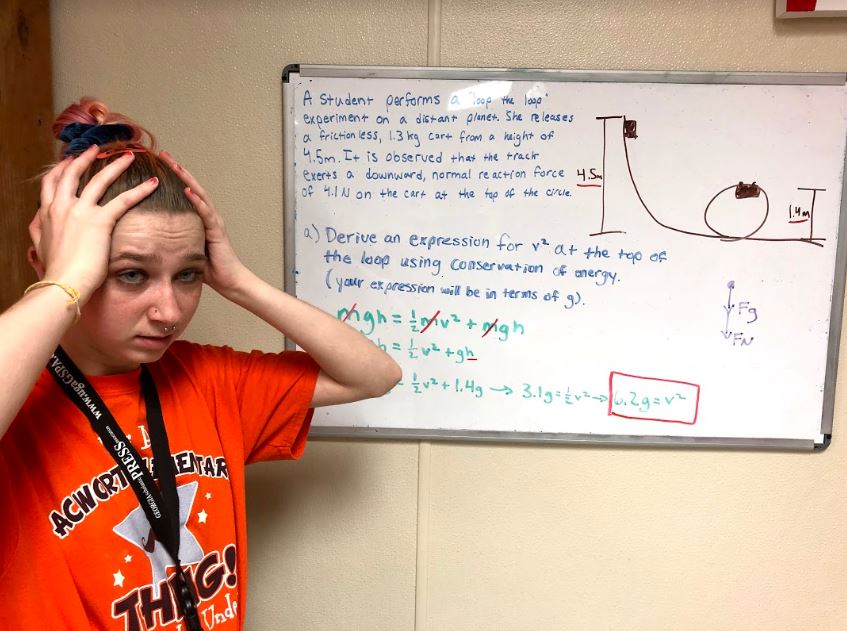Is AP Physics right for you?
Senior Rachel Maxwell looks in horror upon one of the typical AP style questions in AP Physics 1, dealing with rotational motion. The problem requires students to look at the situation conceptually, and only deal with variables and not numbers. This skill takes practice and shows up on the AP exam quite often.
April 24, 2019
One of the most intimidating features of the senior year curriculum comes from the dreaded science credit of physics. The war stories of formula memorization next to rigorous lab grades tend to scare even the brightest of students, but does that hold true for everyone?
So, what exactly is AP Physics?
First and foremost, AP Physics, both 1 and Calculus-based, constitutes one of the most comprehensive and thought-provoking science courses offered in high school. The combination of math with fundamental universal concepts do not come lightly, or without a dedicated amount of time put toward the class. AP Physics will likely not come naturally to most students, and the problems given require a decent amount of thought and application of the theorems.
Concepts such as acceleration, velocity, rotational motion, gravitation, energy, power, and much more comprise the syllabus. These fundamental concepts, though seemingly trivial and relatively uninteresting to the average student, describe the majority of the way things move in real life. In addition to the classic physics problems involving roller coasters (where would physics be without roller coasters?), Physics teacher Mrs. Brennan et al provides concrete examples of concepts like friction, the tension in strings, and rotation in problem sets.
In general, yes, students (unless they hold a physical science credit from middle school) need to take a physics course to graduate from North Cobb. Students can easily overcome the feelings of dread by applying themselves a little more, looking over notes in class, visiting Khan Academy (which houses great, simple explanations of all the AP concepts), or simply going to their teachers before or after school for more help. With dedication, AP Physics can become quite manageable.
“What I love about physics that makes it different from a lot of the other sciences is how it really makes students rethink a lot of assumptions they have made about how the world works around them. While it can be very frustrating to students at first, the ones that truly apply themselves are so excited when they finally “get it.” Physics also may be the first class they take where they have to apply previous knowledge to different situations instead of just memorizing how to solve a particular type of problem. It is such a good class to prepare students for real-world problems they will have to face as they move on to the next chapter of their lives,” AP Physics 1 teacher Jacquelyn Brennan said.
What kind of problems are there in Physics?
Problems vary from unit to unit, and in AP Physics 1, the units comprise of Kinematics; Newton’s Laws and Forces; Work, Energy, and Power; Circular Motion and Gravity; Torque and Rotational Kinematics; and finally, Waves and Circuits. These all come with their own formulas and idiosyncrasies. This class will feel more like a math course than the other sciences preceding it, but thankfully, the College Board provides a formula sheet students can use on the AP exam.
AP Physics, while challenging and requiring daily homework, does not eat up hours out of the day like other AP courses, such as AP Calculus or AP English Language. NC teachers usually only give up to 15 problems a night (mostly direct questions), which only require students to plug in numbers in formulas or concepts directly learned in class. Students should not struggle too much with homework as long as they make sure to stay on top of their work. While providing a reasonable amount of practice for each concept, homework (at least in Mrs. Brennan’s class) determines the grade book weighting for the in-class and take-home portions of the unit tests.
The problems do take some thinking, though, as most AP questions should. Students will find themselves applying concepts rather than plugging numbers into a simple formula. Instead of simply providing some numbers and solving for a variable, AP questions could potentially ask to derive a general formula in terms of certain variables and constants. The problems require a deeper, conceptual understanding rather than rote memorization.
“Physics is not really about getting the “right” answer. It is about using the right tools to analyze a problem and determine what variables are required to get to the solution. It is also about understanding whether that solution you get makes sense or not. If it’s reasonable, great. If not, back to the drawing table,” Brennan said.
Will I get an A in the class?
Not a large percentage of students each AP Physics class receives that sought-for A, and those that do may come out with battle scars and stories of fortune and misfortune (for reference, 4 out of 24 students received an A in Mrs. Brennan’s fall 2018 semester class). AP Physics demands a lot from students, and AP Physics 1, according to the College Board, holds the title of class with the lowest percentage of 5s, with only 5.7 percent of students receiving that distinguishing honor (the calculus-based course does fare quite a bit better though, with 30.2 percent earning a 5).
The tests, as expected, provide difficult and thoughtful questions. AP Physics teachers tend to use released AP questions on tests, and though the scores on the in-class tests may drop to worrying percentages, teachers do allow for breathing room to keep those that actually care above water. Quizzes, labs, and take-home tests can provide that boost students look for in the grade book.
These challenges, though tough, does not mean people do not earn A’s. With the stress of senior year, college applications, and senioritis, priorities can become jumbled and grades often slip to that fateful 89. Students with a solid background in math and science will typically fare better, but the ones that take an active interest in the subject and seek help where they need it can glide through easier than expected.
What’s the difference between AP Physics 1 and C?
Though North Cobb did not explicitly offer it in the 2018-2019 school year, AP Physics C remains an option for students wanting to take a calculus-based physics course. In the most elementary definition, AP Physics 1 only uses algebra concepts, while AP Physics C incorporates calculus (which Isaac Newton essentially invented specifically for physics in his Newtonian Mechanics). The distinction does extend past that though, in that the questions in the C exam often ask more quantitative problems, while the 1 exam may instead ask for more written sections and justifications. AP Physics 1 also incorporates a small amount of Physics 2 concepts of electricity and magnetism, while AP Physics C only covers mechanics.
What if I’m a Magnet student?
Magnet students require an uptick in rigor over the general population of North Cobb. This may mean that even though Magnet students received credit for physical science in middle school, they may need to take it to satisfy the requirements of Magnet. Do keep in mind though that the Magnet bundle for senior year, AP Comparative Government and AP Macroeconomics, will take quite some time outside of class to do well in alongside AP Physics.
“The Magnet program at North Cobb is focused on social studies, science, English language arts, and world languages while supporting the strongest math pathway suitable for each student’s needs and interests. Given the fact that we are designed to support advanced academic instruction in those areas, it stands to reason that AP Physics would be emphasized over on-level physics. Colleges and universities tell us that they would like to see students take advantage of the strongest options at our school.
What has happened over recent years is that more students come to us with the physical science credit from middle school. While this does technically excuse them from the physical science/physics credit to graduate, that middle school course is not as rigorous as a high school course. Therefore, I still recommend AP Physics or another AP or honors science to students who have that physical science credit already. This helps ensure the standard of excellence we promise our students and also a level of readiness for competitive universities,” Magnet coordinator David Stephenson said.
Bottom line: Should I take this course?
If students apply themselves in a dedicated manner and possess a good amount of mathematical skill and out-of-the-box thinking, AP Physics may fit their niche quite comfortably. The difficulty students see their upperclassmen friends endure may scare them off before seriously considering it, but AP Physics provides students with a chance to experience some of the most fundamental forces working and the beautiful mathematics behind it. Future engineers, mathematicians, and hopeful STEM majors would benefit greatly from taking physics in high school and give them a small head start on material that may come in college.
“Of course you should take it! Embrace the challenge and you will be amazed how well you can do and what you can learn and apply to life after college,” Brennan said.








Isabel Salazar • Jul 17, 2020 at 1:52 PM
Hi! I am a incoming Junior that is considering AP Physics. I am already planning for college and I want to major in Aerospace Engineering. I have been told a lot about physics the good and the bad of it. I made all A’s in regular chemistry last year. My chemistry teacher recommended I take regular physics then take AP Physics my senior year but because of the college application process I am thinking about taking AP Physics this year. I also have never token advance math courses , this upcoming year I am taking Pre-AP Algebra 2. I would love some guidance is AP Physics is the right choice. I have a 4.0 GPA as of right now, will this class affect that?
Rebecca Zavala • Aug 12, 2020 at 3:30 PM
Best bet…contact your counselor! And thanks for reading the Chant.